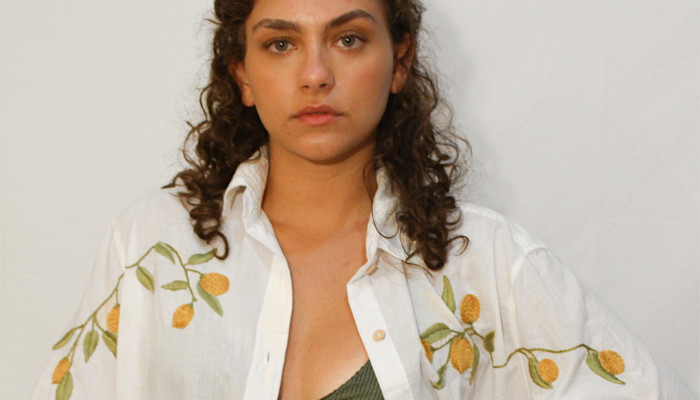Brand spotlight and interview: Nua Collective
2025 update: Nua Collective is now closed.
A few months ago, I came across a new brand called Nua Collective on Instagram. I quickly fell in love with their stunning embroidery and eagerly awaited their launch. This week, I got to chat with the lovely co-founder Nicole about the ethics and mission behind the brand, as well as the sustainable values that drive her and co-founder Camila. I loved speaking with Nicole about Nua Collective, so I hope you'll love reading along. Find links at the end for their website and Instagram.
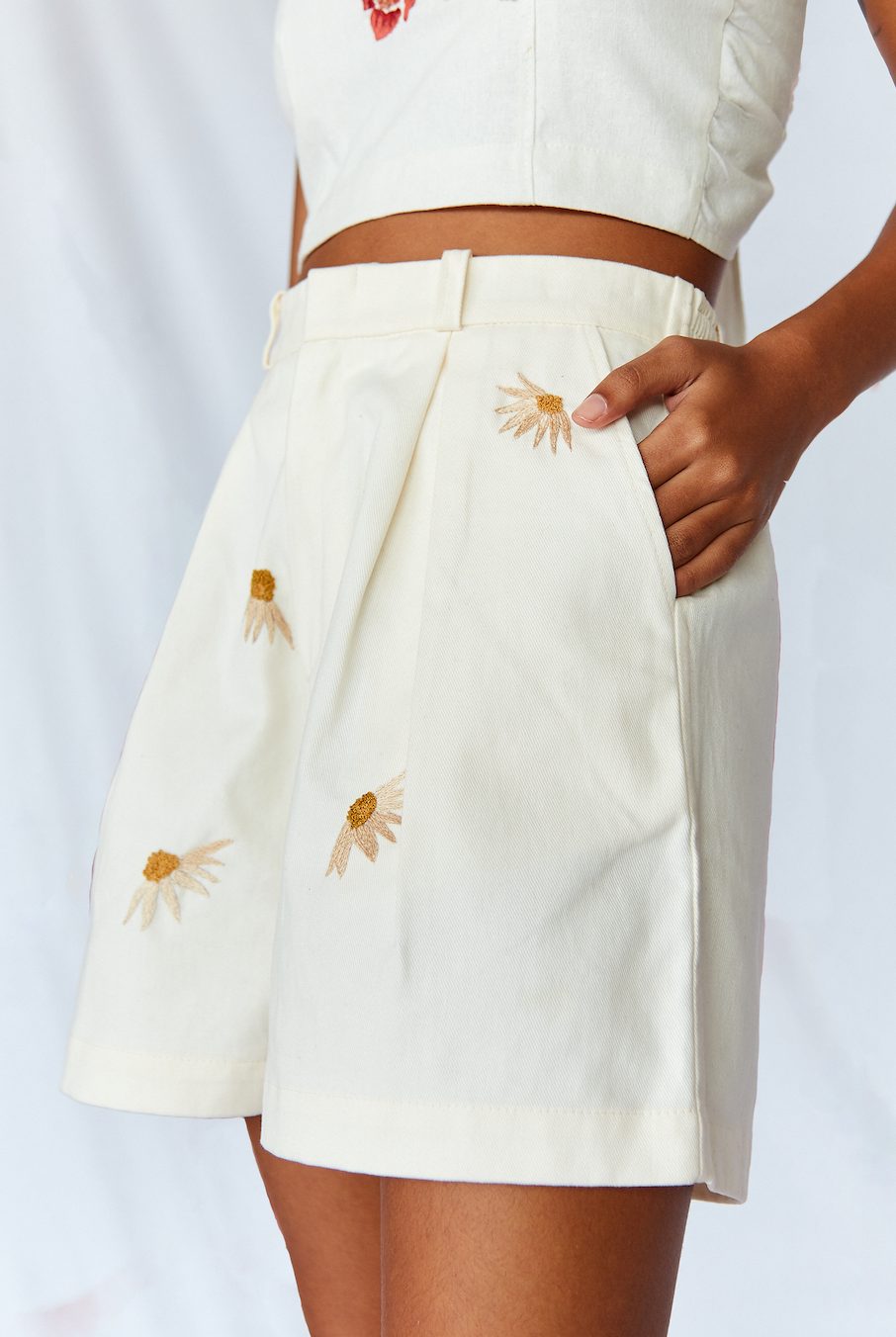
Kate: To start, can you tell me a bit about yourself and your business partner Camila?
Nicole: I’m Nicole, I live in Sydney in Bondi and Camila lives between Rio Di Janeiro and Sao Paulo, she has this split life between the two cities. We were both doing an exchange program in Berlin in 2018 when we met at the language school there and just instantly connected as friends. We ended up spending every day together for the next eight months, dancing and partying and drinking coffees together and sharing ideas about the world.
My background is in journalism, writing for things like Broadsheet. I went on to do law, so that's what I've done for the last two years, but I wasn’t the happiest lawyer. In the back of my mind, I always knew I wanted to do something like start my own ethical fashion brand. I’d been to the Fashion Business Institute just out of uni, then on the flip-side I’d gone to visit Camila in Brazil in the summer of 2018, and I just remember when I was there — and whenever I’m around her — feeling so free to think of what I actually want to do.
Camila is studying psychology, and she’s just about finished, and she also worked really difficult hours. When I was over in Brazil, I just had this idea that we should come together and combine our talents to start something really amazing. I’m probably more of a logistically minded person, I love processes and organisation. Whereas Camila is very much the design, illustrative, and social media guru. And so we had the idea, because she had access to a community in Brazil, through the fact that she’s just a cool person and knows all these creative artists that we had seen over there. We thought, ‘wow, what if we could give access to these artisans to a new market in Australia’, because it’s pretty impossible to access otherwise — we’re just such an expensive market to enter.
COVID had just happened, a lot of these (Brazilian) brands were shutting down shop — Brazil has been really badly affected by COVID, they’re still basically in lockdown — so we assumed they’d be really open to working with a small upcoming platform. So we decided to create Nua together and it’s been a really wild journey and we both are still working — I’m now working as a copywriter for a start-up and Camila is working in HR for a big tech company — but we just keep fuelling Nua for the passion of helping women and connecting communities.
K: That’s amazing, it sounds like you really complement each other as well. You’ve kind of covered the foundation story, but is there anything else you want to add about why you started Nua?
N: Yeah, I guess it was A: going to visit brazil, and then B: chatting to her (Camila) on the phone every day about how crap life was during COVID, and I felt almost guilty that Australia was kind of bad, but I mean, we were home for a month, and you could still go and get your coffee at your local store, it was all pretty much the same. But when I went to visit her in Brazil (I realised) you can’t be on your phone in the street — there’s such danger living there, it’s still very much a developing country — I just had this really strong urge that we could use our love of design and creativity to do something.
I guess we started it with the mission first: help women and find any way we can to help women, and the second was to do it through sharing beautiful products.
I guess we started it with the mission first: help women and find any way we can to help women, and the second was to do it through sharing beautiful products. And I think those two things together make for a really good brand. That will be our mission until the end — just to keep growing out that social and sustainable purpose. We see women and sustainability as a completely interlinked idea, and that’s because we just can’t progress as a society sustainably if there’s one half of the population getting access to economic opportunity. So the more we can give women access to greater income opportunity and sustainable employment, the more we’re going to develop as a sustainable society.
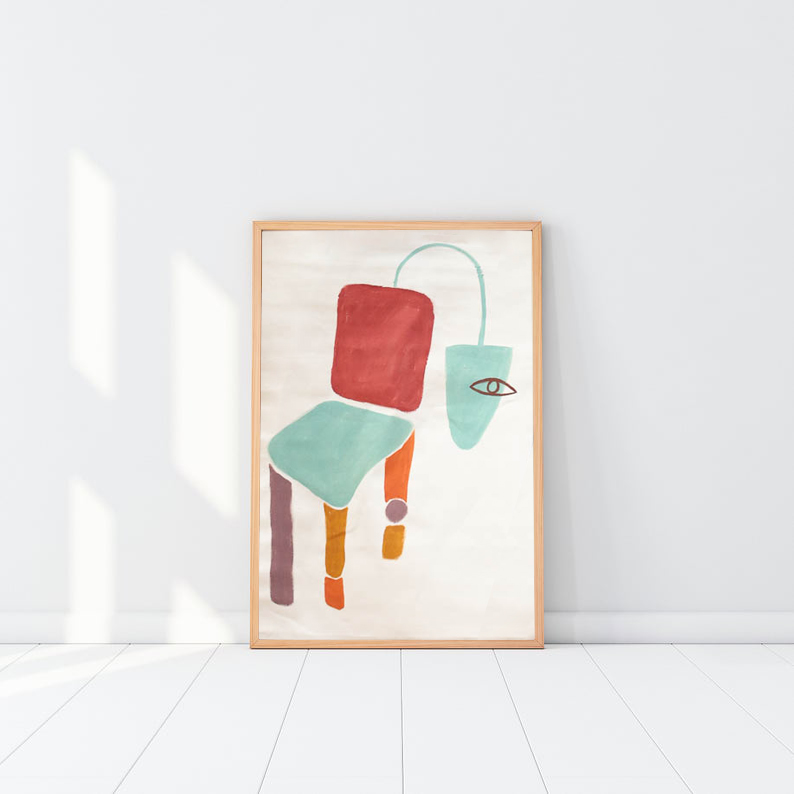
K: Can you tell me the story behind the name of the brand?
N: Yeah, it was really hard to come up with the name. Nua means naked in Portuguese, which I learnt later is actually a really risqué word, unlike in English, so it’s quite interesting as [Brazil] is quite a conservative country. The idea of calling it the ‘naked collective’ is that women possess this vulnerability that can be very much taken advantage of, and it predisposes us to poorer living situations in certain contexts. We thought if we could reinterpret that into a coming together of all this vulnerability, it transforms that into empowerment — and it had to be a Portuguese word. It’s just that whole basis of women helping women that I feel so strongly about. That’s why it’s so nice for you to reach out to us as well because I guess we are only ever going to create a revolution if we’re supporting each other, no one else is going to do it for us. The aim is to be an international brand collective, but our Brazilian and Australian roots really inform our energy and our passion for the brand.
K: Can you tell me about — I’m going to say this wrong — is it Projeto Fio?
N: Yeah, Projeto Fio. It means the Thread Project. Projeto Fio is one of our first big brands we’re working with, and we’re really excited about that. They had a double page spread in Vogue Brazil recently, so they’re pretty cool. They’re like Yevu Clothing if you know that brand? They’re a social art project. They run weekly workshops for women living in the favellas of Brazil — they’re like the slum areas of Brazil. They partner with three different communities and offer embroidery workshops. A lot of the women have come from really damaged, disadvantaged backgrounds or have been subject to things like domestic violence, so Projeto Fio brings them into these workshops, and for a lot of the women it’s the first time they’ve had professional experience — a lot of them do work that is not considered professional work — so they learn skills for working in a professional context, they learn how to embroider, and if they love it, then end up joining Projeto Fio as embroiderers and seamstresses. It’s really fabulous because they are paid the fair wage for that kind of work, and they work in really warm conditions.
"It's a project first, and a brand second."
During COVID, (the women) were all sent home but continued to be paid regardless because that’s a really strong value of the brand. They really look after the fact that working when you come from a disadvantaged background can be harder — with caring for many children and things like that — so the whole brand is based on the ethics of supporting their women. It’s a project first, and a brand second. They also only work with locally sourced, sustainable fabrics and materials, particularly organic cotton. They’re not certified by Australian standards yet — they’re a very small brand — but that’s where they’re working towards and we’re talking to them about that.
For us, the awesome part about working with Projeto Fio is that we can have personal relationships with the people making the clothing that we’re selling. We try really hard to share their stories, they all have really positive relationships with the work that they’re doing. I think the aim is as long as we can support Projeto Fio in Australia, they can keep growing their platform and keep helping more women in vulnerable situations gain access to meaningful employment, and that’s what keeps us going. It’s hard starting a brand, but feeling so passionate about directly impacting people’s lives is just such an awesome thing.
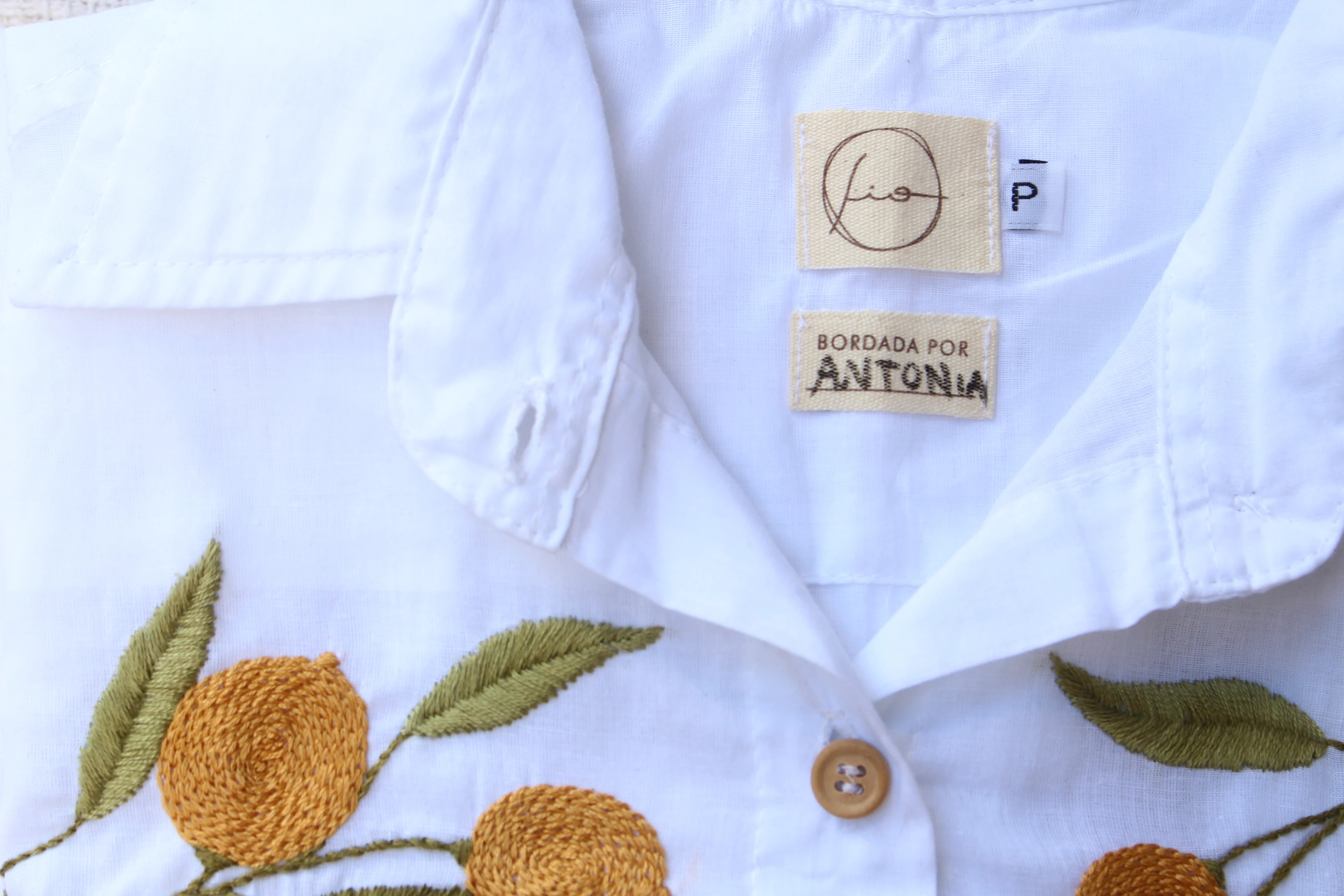
K: Yes, I was having a look at your website before, and I saw you’ve got all the worker’s names and faces on there which is really lovely. I bought my shirt just last week and I saw on the label that it was made by Ana Luisa, then I went on the website, and I could see her, and it was so nice to be able to see who made it.
N: Yeah, I get tingles because you can think in your mind about them laying their hands on the fabric and getting joy, and you can see each stitch is considered. I think it’s just such an amazing thing.
K: Yeah, and I’ve seen brands before where each employee gets a number and they just put the number on the garment, and it’s nice because you can look them up, but this is the next level because it’s actually got their handwriting on there.
N: It’s great because you’re reminded it’s really an authentic person. I would not want to write with my handwriting on a garment, it’s shocking!
K: It’s nice though to know it was made by a person, not a machine.
N: Yeah exactly, but I guess slow fashion is the hard game because it’s more expensive to make and harder to scale, but if you can see you are directly helping someone have a better life through wearing their garments, it’s such a meaningful and mindful way to shop and wear clothing.
K: And also from the consumer end, having these pieces that have a story behind them — you’re more likely to look after them and care for them. And when you’re wearing the clothes you want to talk about them.
N: 100 per cent. And it’s interesting you say that because one of my friends bought the same shirt as you and she’d never really thought of slow, sustainable fashion before. She called me saying she loved it so much and she just said, ‘wow, I’ve never really thought about the fact that by buying from Zara I’m actually doing bad for the world. And I’d never turned my mind to the fact that churning through Glassons clothes is actually really bad’. I was really, really happy to know that by her buying a piece that she loved we were able to start that conversation and help start her journey onto that mindful consumer pathway. It’s exactly what we wanted to do through Nua. It’s mine and your mission, and I think the more people get onto this way of thinking about consumption, the better world we’re going to have.
K: Yeah I agree, and I think in my experience as well, it’s not necessarily that people don’t want to be shopping mindfully and sustainably, it’s more that they don’t know there’s a problem.
N: I think if you run in certain circles, you’re aware of it. I live with my housemate who’s a yoga teacher and like, we’ve got our compost bin, but maybe before I lived with her, I might not have had much insight into that. But you learn from people around you.
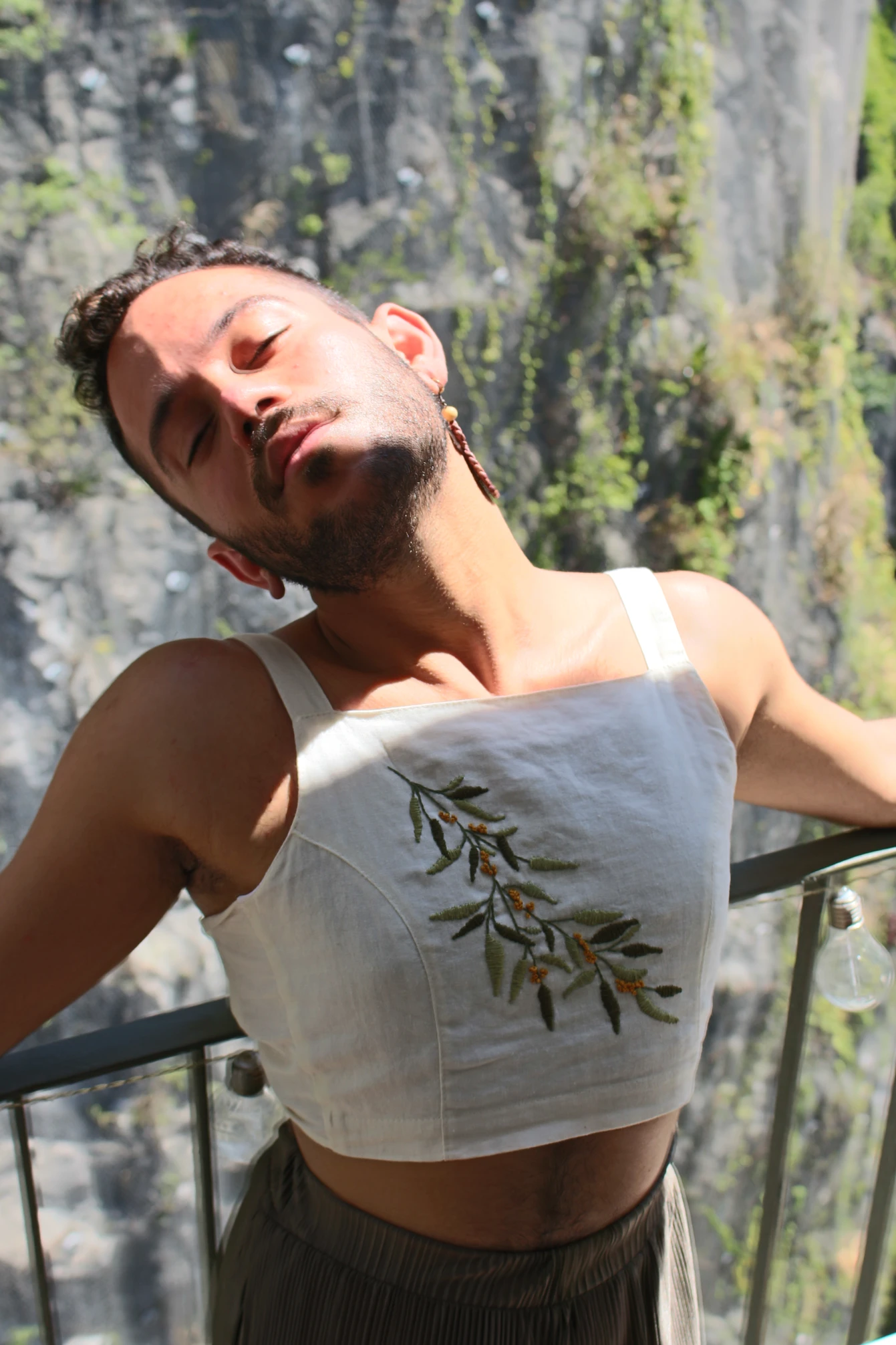
K: You’ve included diverse models on your Instagram, is inclusivity important for your vision for the brand?
N: Yeah definitely. Camila and I are not stick-figure girls and when we started Nua we wanted to see the whole of society represented in the clothes, and that spoke to how we ordered our sizing — we go up to XL down to XS.
One of our key models on our Instagram is our good friend Felipe. When I was living in Berlin I was living in his house, then when I moved back to Australia, Camila moved into my room. Felipe is just ‘gender expression’ to the very core, and he introduced us to this amazing queer network in Berlin, and I think it was the first time I opened my mind to the fact that we live in a very binary society in my small Australian circle. Obviously many people are doing it (being inclusive), but I think when small brands do it, it becomes the norm rather than the challenge. And the same goes for using different ethnicity, weight and size models; for us it was really important to make anyone who wants to purchase from us feel included in our brand story, because we’re both from very multicultural backgrounds, so to feel like anyone would ever feel excluded would really upset me.
Diversity is so important and we hope the fashion industry moves towards using more diverse models and not just in a tokenistic way so it becomes the norm in the future.
We feel really proud of the models that we’ve used, and all of the models are actually friends of the (affiliated) brand creators, so we’re working with small communities of people, and same goes for our own models — we’ve got Brazilian, German, there’s a Swiss girl in there, we’re using all our contacts everywhere. So 100 per cent, diversity is so important and we hope the fashion industry moves towards using more diverse models and not just in a tokenistic way so it becomes the norm in the future.
K: You’ve already gone into this a bit, but is there anything more you can tell me about where and how your clothes and homewares are made?
N: Yeah sure, the art is all on sustainably sourced canvas that is locally made (in Brazil) and there’s no bleaching used in the process. We have one artist on board at the moment, Patricia from the brand Paira, and she works with water-based paint because acrylic paint is really bad for the environment as it contains microplastics that wash up into the ocean when you wash your brushes. Working with an artist with really sustainable and transparent practices is really exciting.
For the other (clothing) brands, they’re handmade so you know that they’re small collections, with no wasted materials. All the offcuts go into making their (Projeto Fio) homewares range, which is great, because often you lose a lot of cuttings when you’re creating tailored dresses. The fabrics are all organic cotton, they don’t use any synthetic fabrics in the making of their clothing. The embroidery threads are all cotton, the buttons are all wooden. You would have seen in your shirt; the fabric is cotton boil which a very high-quality material.
K: It’s so soft as well.
N: Yeah it’s beautiful. Australia doesn’t have much access to that kind of material, but there are so many beautiful textiles over on that side of the world (in Brazil). We’re really fortunate to work with brands who have access to really premium quality cotton and materials. At the moment we don’t have the certifications — we’re really small and certifying is really expensive. But the aim will be in future to work with brands for those certifications and try to get that certification ourselves. But of course, we’re very small at the moment, but I think just knowing that the materials are sourced locally and that the production line is so small — you’re not passing it from person to person — and all the working conditions of our seamstresses and embroiderers are as good as can be. They all work together with the founders of the brand in a small studio in Rio. It’s very small scale, and as long as things stay small, you have a lot more control over the process.
K: So you’ve mentioned the organic cotton and small runs of collections, are there any other steps you’re taking to be a sustainable brand?
N: All our packaging is made from recycled materials and we don’t use any extra unnecessary packaging. We’ve been sending garments in cardboard boxes made from recycled materials. When we’re doing our brand research — we’re in the process of building out and growing our platform — we need to have information about where fabrics are sourced and what brands are paying, so we see their transparency reports which are on the brand’s websites. We are currently working with some brands on our next collection that work with recycled materials and recycled PET materials. We’re still very much at early stages, but I think just sticking to those organic cottons and locally sourced fabrics gives us much more control over the production line.
K: You launched last week, how’s the first week been?
N: Given it was the coldest day in New South Wales for the last thirty-four years and we’re selling very lightweight material products, there’s been awesome reception and we’ve almost sold out of some of our homewares and artworks — which is what we hoped for given this time of year. This is probably more of a soft launch, and the aim is to grow out our collection to have much more on the platform in spring and summer. But baby steps.
Everyone’s who’s received a product has been so happy with it, and it gives me so much joy to see women wearing these clothes and feeling so good about themselves in them. And seeing our cushions on peoples’ couches — it’s really cool. The aim now is, for our next launch around October, we’re talking to some Australian artisans which is exciting, and also talking to more brands in Brazil. Right now, they’re our two markets, just because it’s easier for us to control them. But we’re doing well, and we’re really stoked about it. And the more people like you who find us, the more we can keep growing. It obviously takes some time to get the word out there, but the more people who see the product, the more people will fall in love with it.
You might see us at a Bondi market in the coming months, so look out for that. We’re very small, we’re very new, but there’s a lot in the pipeline.
As always, this is not a sponsored article; however if you'd like to know more about Nua Collective or shop from their collections, head to their website here.
You can also find them on Instagram @nuacollective.
All images used with permission from Nua Collective.
